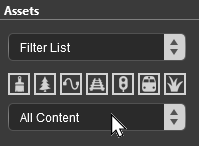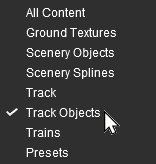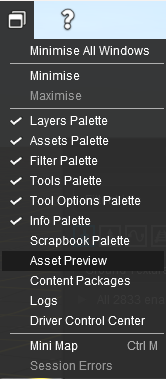The information in this Wiki Page applies to TANE, TRS19, Trainz Plus and TRS22.
|
|
 |
Track Priority Marks are purple coloured track markers that are invisible in Driver but visible in Surveyor. They are used to direct specific trains under AI control through the track section where they are placed |
 |
They only work on AI controlled trains. They have no effect on manually controlled trains |
 |
The direction that the marker is pointing has NO EFFECT on its operation |
 |
Track Priority Marks are used with Priority Levels that are assigned to each train |
|
What are Track Priority Markers?
|
|
|
 |
|
 |
 |
 |
Priority Levels have no set meanings but can be assigned to specific AI trains to force them through selected sections of track (the track sections are defined as between consecutive junction sets) |
 |
Priority Marks can be placed in a Route Layer or in a Session Layer |
 |
Notes:
|
 |
Placing Priority Marks in a Route layer (e.g. in the same layer as the track) means that they will be available in all Sessions created using that particular Route |
 |
Placing Priority Marks in a Session layer means that they will only be available in that Session. This can be useful if two or more Sessions are being created and you want to use different Priority Marks in each Session |
|
 |
Information on Route and Session layers can be found at:-
|
Adding a Track Priority Marker
|
 |
|
 |
 |
 |
 |
In Surveyor Classic (S10)
|
 |
 |
|
|
|
|
Adding a Priority Mark (S10)
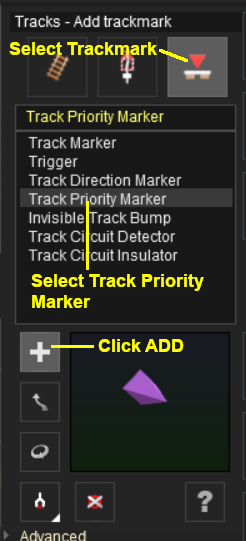 |
| Steps: To add a Priority Mark:- |
 |
Open the Tracks Tool Flyout or press the F4 key |
 |
Left Click on the Trackmark button or press the V key |
 |
Left Click on the Track Priority Marker |
 |
Left Click the + Add button - it may already be selected - or press the A key |
 |
Left Click on the track location where the priority marker is to be placed |
This will place the Track Priority Marker on the track and open its properties window.
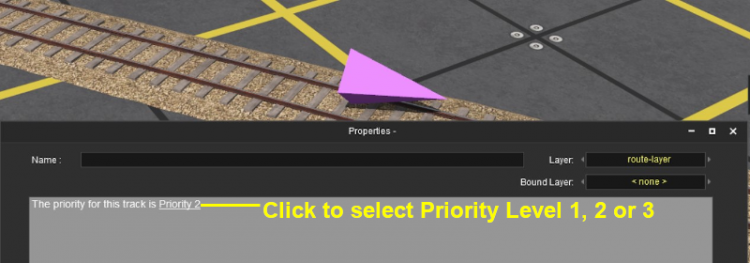 |
 |
Left Click the default Priority value shown to select one 1, 2 or 3. Each Left Click will cycle to the next value |
|
|
Immediately after the Priority Mark has been placed its properties window will appear. You can:-
 |
Set the Priority Level for the Priority Mark, |
 |
Enter a Name for the Priority Mark, and |
 |
if needed, select a Layer and a Bound Layer - see the Trainz Wiki Page  How to Use layers for the details How to Use layers for the details |
|
Set the Priority Mark Effect Radius (S10)
At the bottom of the Track Tools flyout menu is an Advanced button. Left Click this button to open the advanced tools.
| The Effect Radius sets the size of green "effect wings" attached both ends of the marker. It has no effect on its operation but allows you to keep its "visibility" clear of other track objects such as junctions and other markers. |
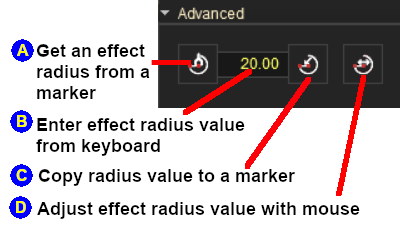 |
| Steps: To set a Priority Mark Effect Radius:- |
 |
In the Track Tools flyout, Left Click on the Advanced button to open the Radius tools and properties. You will have a choice of 4 methods to set and adjust the Effect Radius |
| Options: Choose one of:- |
 |
To copy the Effect Radius of an existing Priority Mark
 |
Left Click the Get Effect Radius icon |
 |
Left Click on the Priority Mark whose radius you want to copy - the radius will be copied into the Effect Radius Value text box (the default value is 20.00 metres) |
 |
To apply the new value see option  below below |
|
 |
To manually alter the Effect Radius value
 |
Type the new value (in metres) into the Effect Radius Value text box |
 |
To apply the new value see option  below below |
|
 |
To apply a value in the Effect Radius Value text box (from methods  , ,  or or  ) to another Priority Mark ) to another Priority Mark
 |
Left Click the Copy Radius Value icon |
 |
Left Click on the Priority Mark that is to receive the new value (you can click on more than one) |
|
 |
To adjust the Effect Radius value up or down
 |
Left Click the Adjust Effect Radius button |
 |
Select the Priority Mark |
 |
Left Click and Drag Forward (to increase the value) or Backward (to reduce the value) |
 |
The new value will be immediately applied to the selected Priority Mark as the mouse moves (but only one Priority Mark at a time) |
|
|
|
|
 |
Once you have an Effect Radius entered in the value box, you can apply it to any number of Priority Marks by using method  shown above shown above
|
|
In Surveyor 2.0 (S20)
|
 |
 |
|
|
|
|
Surveyor 2.0 is currently only available for Trainz Plus and TRS22 Platinum.
Adding a Priority Mark (S20)
 In the Asset Palette either:-
In the Asset Palette either:-
 Left Click on the Track Mesh Filter icon Left Click on the Track Mesh Filter icon
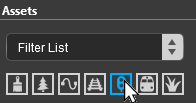
|
|
OR |
|
|
 Shortcut Shortcut
If you already have a Priority Mark placed in your route then:- |
 |
move the tool pointer over the existing priority marker object and hold down the Alt key. The object name will appear in a ToolTip attached to the pointer |
 |
Alt + Left Click (hold down the Alt key and Left Click on the priority mark to identify it in the Assets Palette and to select the Placement Tool. Release the key. |
Jump to Step  below. below. |
|
 To narrow down the filter list, type "mark" (UPPER/lower case does not matter) in the Search Text Box
To narrow down the filter list, type "mark" (UPPER/lower case does not matter) in the Search Text Box
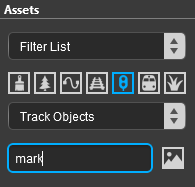 |
 This will list all the Track Objects containing the text "mark" in the filter list. This will list all the Track Objects containing the text "mark" in the filter list.
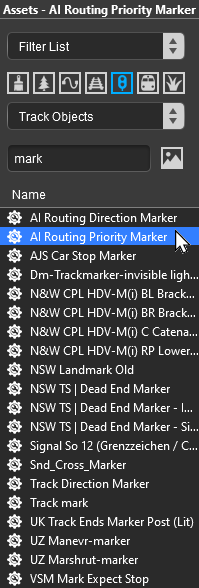 |
 Left Click on the item name AI Routing Priority Marker. Left Click on the item name AI Routing Priority Marker.
If you are not sure about an asset then Double Left Click on the name to bring up its image and description. |
|
 Place the Priority Mark on the track.
Place the Priority Mark on the track.
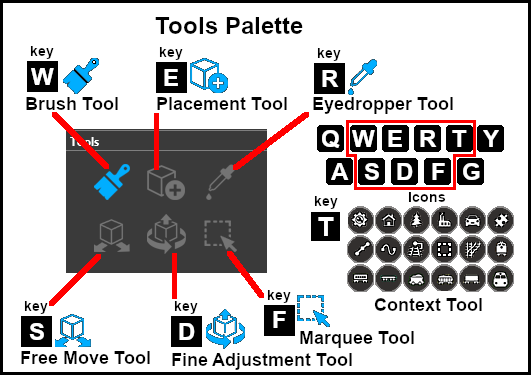 |
 |
Notes:
|
 |
To add a priority mark, or any object, you will need to select the Placement Tool |
 |
To edit a priority mark once it has been placed you will usually use either the Free Move Tool or the Fine Adjustment Tool |
|
|
|
 |
If you need to rotate the Priority Mark to face the opposite direction then:-
| Steps: |
 |
select the Priority Mark and Left Click on its Context Menu Icon (or press the T key) |
 |
from the popup menu select the Rotate Trackside option |
|
| Note: the direction it faces has no effect on its operation |
|
Set its Priority Level (S20)
| The Priority Level is the ONLY important property of a Priority Mark. Its possible values are 1, 2 and 3. |
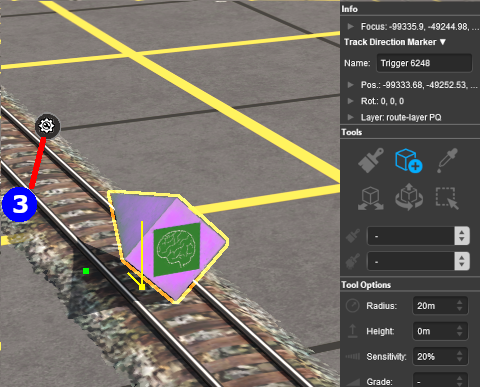 |
| Steps: To set its Priority Level:- |
 |
Left Click on its Context Menu Icon (or press the T key if the object has already been selected)
 |
From the popup Context Menu select Edit Properties |
 |
In the Script Properties section, Left Click on the Priority number to cycle through the possible values |
|
|
|
Change Its Name (S20)
The name of the marker is only useful for finding it in the route. It is not used for any operational purpose.
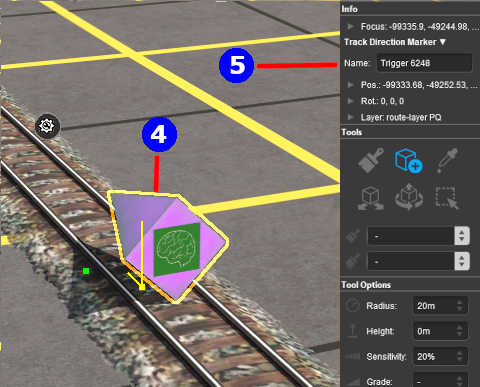 |
| Steps: To change the name of a Priority Mark:- |
 |
using either the Free Move Tool or the Fine Adjustment Tool select (Left Click on) the Direction Mark to be renamed |
 |
in the Info Palette (you may need to make this palette visible - see the Notes: for Step 1 above) Left Click in the Name: entry box. Enter a name for the Priority Mark and press the Enter key |
|
|
Set its Effect Radius (S20)
| The Effect Radius sets the size of green "effect wings" attached both ends of the marker. It has no effect on its operation but allows you to keep its "visibility" clear of other track objects such as junctions and other markers. |
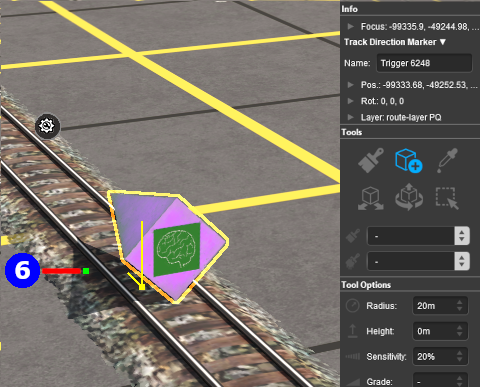 |
| Steps: To adjust the effect radius of a Priority Mark:- |
 |
Left Click and Drag Forward or Backward on the Yellow Dot next to the Priority Mark to increase or reduce its Trigger Radius |
|
Notes:
The effect of a Priority Mark only applies between the two junctions on each side of the marker. As long as its radius (default value is 20m) fits between the two junctions it will not affect any other track sections.
The only situation where changing the radius could be important is when the distance between the two junctions is smaller than the marker trigger radius. There is no advantage in increasing the radius beyound its default value. |
|
|
Move a Priority Mark Along the Track (S20)
Priority Marks can be moved along the track or to other tracks.
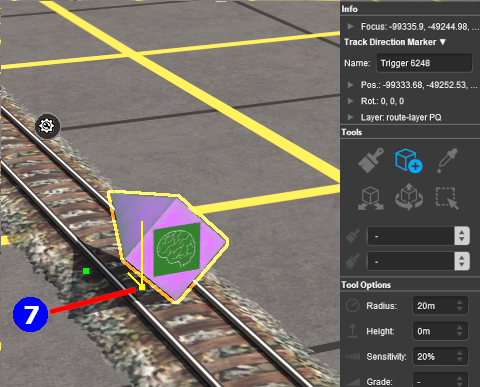 |
| Steps: To move the Priority Mark:- |
 |
Left Click and Drag Forward or Backward on the Yellow Dot next to the Priority Mark to move it along the track or to another track |
|
|
Move the Priority Mark Vertically (S20)
| Priority Marks can be physically placed above (or below) the track. This feature allows them to be placed, for example, above the track so that they will not be hidden in Surveyor if a consist is parked on a marker. |
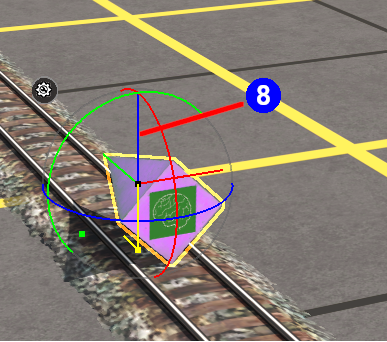 |
| Steps: To move a Priority Mark vertically:- |
 |
This option is only available with the Fine Adjustment Tool - the D key |
|
 |
Left Click and Drag Forward or Backward on the Blue Vertical Axis Line above the Priority Mark to it up or down |
 |
If you need to return the Priority Mark to its original position then:-
| Steps: To correctly reattach the Priority Mark to the track:- |
 |
select the object and open (Left Click on) its Context Menu Icon (or press the T key) |
 |
from the popup menu select Reattach to Track |
|
|
|
|
Move the Priority Mark Horizontally (S20)
| Priority Marks can be physically placed left or right alongside the track. This feature allows them to be placed, for example, beside the track so that they will not be hidden in Surveyor if a consist is parked on a marker. |
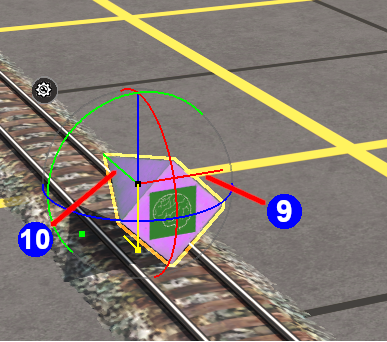 |
| Steps: To move a Priority Mark horizontally:- |
 |
This option is only available with the Fine Adjustment Tool - the D key |
|
 |
Left Click and Drag Forward or Backward on the Red Horizontal Axis Line attached to the Priority Mark to move it left or right |
 |
Left Click and Drag Forward or Backward on the Green Horizontal Axis Line attached to the Priority Mark to move it forward or back |
 |
If you need to return the Priority Mark to its original position then:-
| Steps: To correctly reattach the Priority Mark to the track:- |
 |
select the object and open (Left Click on) its Context Menu Icon (or press the T key) |
 |
from the popup menu select Reattach to Track |
|
|
|
|
 |
Notes:
The Green Horizontal Axis Line shown as  in the image pointing forward from the Priority Mark will move it forward/backward regardless of whether it is on the track or not. It has the same effect as in the image pointing forward from the Priority Mark will move it forward/backward regardless of whether it is on the track or not. It has the same effect as  Move a Priority Mark Along the Track. However, by using this tool it is possible to move the Priority Mark beyond the end of the track if that is ever required. Move a Priority Mark Along the Track. However, by using this tool it is possible to move the Priority Mark beyond the end of the track if that is ever required. |
|
Assign a Priority Marker to a New Layer (S20)
Assigning Priority Levels to Trains
|
 |
 |
 |
 |
 |
 |
 |
A higher priority level does not mean that one consist is more important than another. A priority 1 consist will not be given first access to a junction, for example, or be the first one to depart. The priority levels have no set meaning beyond what you decide they will mean. |
 |
Notes:
|
 |
Every locomotive (and its consist) must have a Priority Level of 1, 2 or 3. The default priority level of every locomotive is 2. You cannot assign NO Priority to a locomotive |
 |
Setting the priority level of any wagon in a consist will set the priority level of ALL the wagons (including the loco) to the same value |
|
| For example you could assign priority 1 to express trains and 3 to slow general "all stops" freight trains, or you could assign priority 3 to express trains and 1 to slow general "all stops" freight trains, it is up to you. These values will not alter the speed or importance of these trains but will only decide which paths they should take. |
In Surveyor Classic (S10)
|
 |
 |
|
|
|
|
To assign a priority level to a consist.
| Steps: To assign a priority level to a consist:- |
 |
Open the Trainz Flyout tool (the F7 key) |
 |
Left Click on the ? (Properties button) |
 |
Left Click on any rolling stock object in the selected consist
 |
Setting the Priority Level of one rolling stock object (wagon, loco) in a consist will set ALL the rolling stock objects in the consist to the same Priority Level |
|
 |
| In T:ANE and TRS19:- |
 |
Left Click on the Train Priority value - each click will cycle through the values 1, 2, 3. The default priority level for all consists is 2 |
 |
Left Click the  icon to accept the change icon to accept the change |
| In Surveyor Classic for Trainz Plus and TRS22:- |
 |
Left Click on the Priority value to open a drop down menu. Select the required Priority Level of 1, 2 or 3 |
 |
Left Click the Save Changes button to accept the change |
|
|
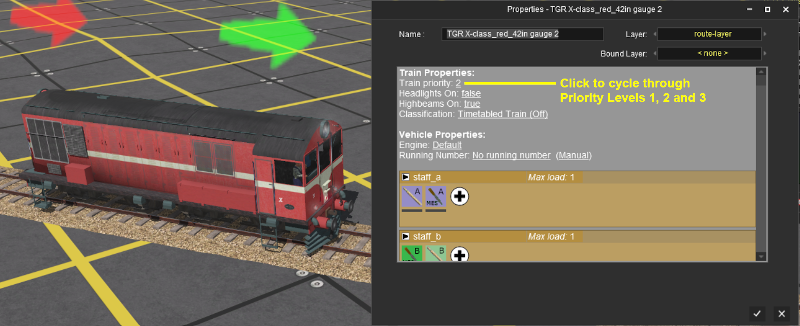
In Surveyor 2.0 (S20)
|
 |
 |
|
|
|
|
Surveyor 2.0 is currently only available for Trainz Plus and TRS22 Platinum.
To assign a priority level to a locomotive.
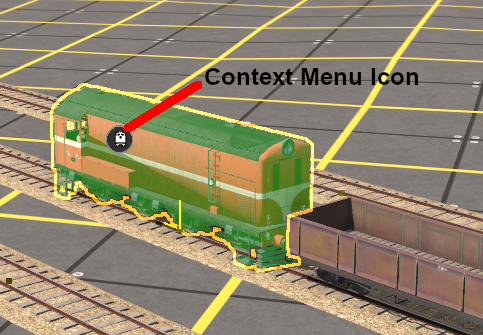 |
| Steps: To assign a priority level to a consist:- |
 |
select either the:-
 |
the Free Move Tool (press the S key), OR |
 |
the Fine Adjustment Tool (press the D key) |
|
 |
Left Click on any rolling stock object in the selected consist
 |
Setting the Priority Level of one rolling stock object (wagon, loco) in a consist will set ALL the rolling stock objects in the consist to the same Priority Level |
|
 |
Left Click on the Context Menu Icon (shown in the image on the left or press the T key) to open up the objects control menu |
 |
Left Click on the Edit Properties option in the popup menu |
 |
Left Click on the Priority value to open a drop down menu. Select the required Priority Level of 1, 2 or 3 |
 |
Left Click the Save Changes button to accept the change |
|
|
Priority Marker Operation
|
|
 |
 |
 |
 |
 |
 |
Priority Marks only work on AI controlled trains. They have no effect on manually controlled trains |
 |
Priority Marks force a AI trains that with the same priority level into taking the path containing the marker |
 |
AI trains will ignore a path containing a Priority Mark that does not match its own priority level unless that path is also the shortest available |
 |
If the specified path is blocked, then the AI will ignore the Priority Mark and find another path |
 |
The direction that the Priority Mark is pointing has NO effect on its operation |
Consider the situations represented in the diagrams below. Three trains - Red, Green, Yellow - have been given priority levels of 1, 2 and 3 as shown. Each is given the driver command Drive to Trackmark or Navigate to Trackmark. The destination trackmark is shown on the right.
In Figure 1 below, no Track Priority Markers have been set. All three trains will take the shortest path, assuming there are no blockages.

Figure 1
In Figure 2 below, a Track Priority Marker has been placed on the top loop line and has been given a priority level of 1. The red train (priority level 1) will now take the priority 1 path because it will "see" that as being the shortest of the three possible paths. The green and yellow trains (priority levels 2 and 3) will still "see" the middle path as the shortest.

Figure 2
In Figure 3 below, a Track Priority Marker has been placed on the lower loop line and has been given a priority level of 3. For the same reasons as explained above, the yellow train (priority level 3) will now take the priority 3 path because it now sees that as the shortest.

Figure 3
In Figure 4 below, Track Priority Markers have been placed on the upper and lower loop lines and set as shown. The red and yellow trains will take their respective loop paths while the green train is unaffected.

Figure 4
An exception, shown in Figure 5 below, will occur when a Track Priority Marker path has been blocked, for example by another train under AI or manual control. In the figure the lower loop path has been blocked. The red train will take its assigned path, the green train takes its shortest path and yellow train will be forced to take what it "sees" as the next shortest path.

Figure 5 |
 |
Notes:
An AI controlled train will not attempt to find an alternative path around a blockage if:-
 |
the Drive To driver command is used, and |
 |
the blocked path is the shortest path and has the same priority value as the consist |
This is the normal operation of the Drive To command and is not caused by the Track Priority Markers or consist priority levels. This situation would occur with or without the use of priority levels and markers.
|
|
Another exception, shown in Figure 6 below, will occur when a driver command overrides a Track Priority Marker. In the figure the yellow train (priority level 3) has been given the driver command Drive To Station followed by Drive to Trackmark. As the station is not on the priority 3 path, that path will be ignored to reach the station and then the trackmark. After stopping at the station the train will not reverse back onto the main line to then use the priority 3 track.

Figure 6
The Special Case of Priority 2
Figure 7 below shows a situation that does not fit the points made above. A Track Priority Marker has been set to priority level 2 and placed on the lower loop. The green train has been given the command to drive to the trackmark but ignores its assigned priority 2 path and proceeds via the shortest actual path. Track that has not been assigned a Track Priority Marker will have a default priority level of 2. In this situation, the green train "sees" two paths that match its priority level so it takes the path that is the actual shorter of the two.

Figure 7
Track Priority Markers can also be used to direct trains away from specific paths. Figure 8 below shows how this can be done. A Track Priority Marker set to priority level 1 has been positioned on the shortest physical path. This will block all trains of priority level 2 and 3 from using that path - they will see it as the longest available path. A second Track Priority Marker set to priority level 3 has been positioned on the 2nd shortest physical path. This will block all trains of priority level 1 and 2 from using that path. The end result is that the green train (priority level 2) has only one path available - the longest physical path.

Figure 8
The situation shown in Figure 8 above only works up to a point. Figure 9 below shows what will happen when ALL paths are set to a blocking priority level. The green train (priority level 2) will ignore all the priority markers and choose its own shortest path. Track Priority Markers will only make a path *look* longer or shorter. When all paths have conflicting priorities to an AI train, then the AI will go back to selecting the actual shortest physical path.

Figure 9
|
Modifying Train Priority Levels
|
|
|
 |
 |
 |
 |
 |
The Priority Level of a consist in Driver can be altered manually or automatically |
 Manually in Driver
Manually in Driver
This can be done "on the fly" using the mouse.
| Steps: To edit a consists Priority Level in Driver:- |
 |
Ctrl + Right Click (hold down the Ctrl key and Right Click) on the locomotive or on any of the wagons in the consist
 |
Setting the Priority Level of one rolling stock object (wagon, loco) in a consist will set ALL the rolling stock objects in the consist to the same Priority Level |
|
 |
Left Click on the View Details option from the popup menu |
 |
Depending on your version of Trainz, choose between:-
 |
T:ANE, TRS19 and TRS22:-
 |
Left Click on the Train Priority value - each click will cycle through the values 1, 2, 3. The default priority level for all consists is 2 |
 |
Left Click the  icon to accept the change icon to accept the change |
|
 |
In Trainz Plus and TRS22 Platinum:-
 |
Left Click on the Priority value to open a drop down menu. Select the required Priority Level of 1, 2 or 3 |
 |
Left Click the Save Changes button to accept the change |
|
|
|
|
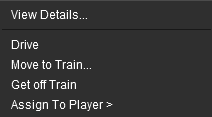 |
OR
 Using the Session Editor
Using the Session Editor
This can be done in Surveyor in the Session Editor  Driver Setup Rule
Driver Setup Rule
| Steps: To edit a consists Priority Level in the Session Editor:- |
 |
Open the Session Editor - this is found as Edit Session in the T:ANE Surveyor Main Menu and in the TRS19 (and later version) Edit Menu |
 |
Left Click on the Driver Setup Rule then Left Click on the Edit button |
 |
Insert the command Priorityz at the appropriate place in the Driver Command Bar for the selected Driver and set it to the new level
 |
The command Priorityz must be downloaded from the DLS and installed in your copy of Trainz |
|
|
 |
Information on adding driver commands can be found on the Trainz Wiki Page at:-
|
Track Priority in Map View
|
|
|
 |
 |
|
 |
|
In Surveyor when using Map View or zooming the camera right out, the tracks will be shown colour coded according to their assigned track priority level. If the track layout shown in Figure 4 above, with the priority markers as used in that figure, was shown in Map View then this would be the result.
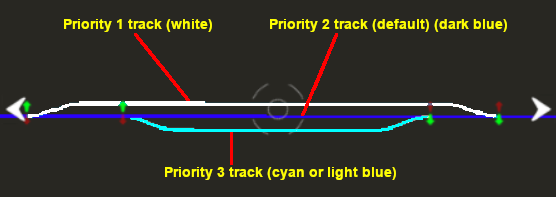
Tracks that have not been given a priority marker will be shown as dark blue indicating that they have the default priority level 2. |
Related Links
Trainz Wiki
 |
More Tutorials and Guides to Using Trainz
|
This page was created by Trainz user pware in September 2019 and was last updated as shown below.
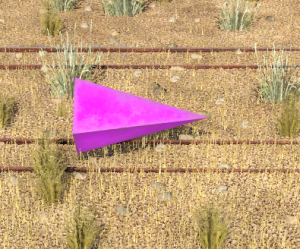



In the Asset Palette either:-
To narrow down the filter list, type "mark" (UPPER/lower case does not matter) in the Search Text Box

Place the Priority Mark on the track.
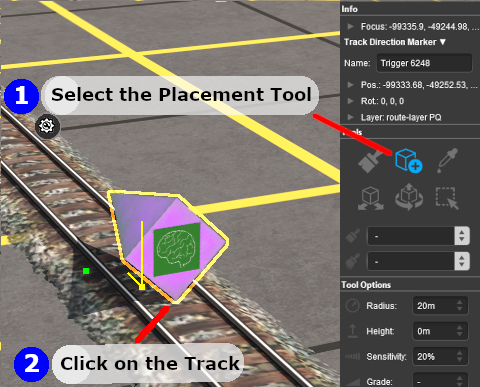






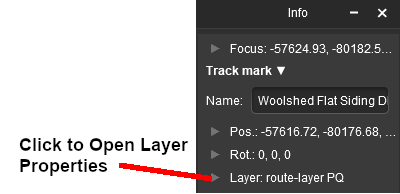
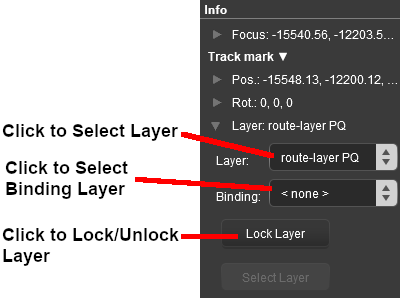


![]() Manually in Driver
Manually in Driver
![]() Using the Session Editor
Using the Session EditorDriver Setup Rule





